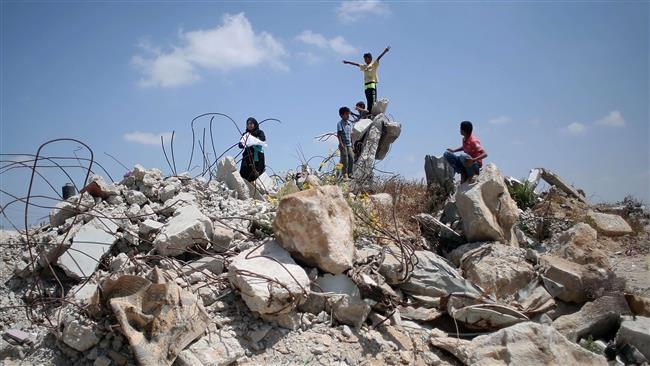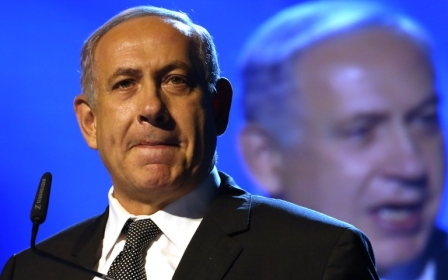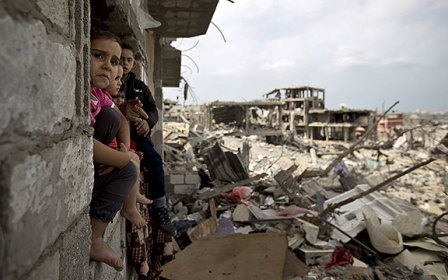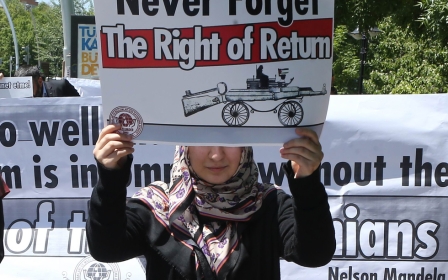Naval blockade of Gaza to continue after Israel-Turkey reconciliation

Israeli Prime Minister Benjamin Netanyahu and his Turkish counterpart Binali Yildirim on Monday set out the terms of a reconciliation deal that will see the siege of the Gaza Strip eased, but not ended.
The long-awaited deal - which ends months of negotiations - will mean that Israel maintains its naval blockade of the Gaza Strip, in place since 2007.
Palestinian officials had said prior to the deal that Turkey was attempting to persuade Israel to lift its siege of the coastal enclave in return for normalising relations, which were officially cut off in 2010 when Israeli commandos stormed the Mavi Marmara aid flotilla to Gaza, killing ten Turkish civilians.
However, Netanyahu told a press conference in Rome on Monday that the deal will not include a lifting of the naval blockade, but will allow Turkish aid to enter the strip through the Israeli port of Ashdod.
Speaking during a separate, but simultaneous press conference in Ankara on Monday, the Turkish prime minister said that 10,000 tonnes of Turkish aid will enter Gaza through the port on Friday, a move that he said would be tantamount to an end to the blockade.
"It took years to reach this agreement," Yildirim said, calling on the governments of Turkey and Israel to fully implement the agreements included in the deal.
There were mixed reactions across Israel and the occupied Palestinian territories after the announcement.
Israeli opposition leader Isaac Herzog accused Netanyahu of "grovelling" to Turkey by agreeing to pay compensation.
Hanan Ashrawi, an executive committee member of the Palestine Liberation Organization (PLO), told Middle East Eye, “It's a pact of self-interest, both by Turkey and Israel."
Senior Hamas official and one-time political adviser to former Prime Minister Ismail Haniyeh, Ahmed Yousef told MEE that the agreement was "a good deal" that allows Turkey to help both the Palestinians and itself.
He conceded that, “Yes, there are some (of our) people who don’t like Turkey – the great Muslim country – to normalise relations with the Israelis before ending their occupation to the West Bank and Gaza.”
But, with a mixture of realism and resignation, said: “This is what they can do right now.”
Pledge to publicise deal
The deal will see Israel and Turkey return ambassadors to their counterparts as soon as possible.
Turkey also gained the right to implement a number of humanitarian projects in the impoverished strip, including the building of a 200-bed hospital.
Building projects in the Strip have floundered under the blockade, which forbids the import of key materials like concrete.
Netanyahu said the deal was of great "strategic significance," pledging that it will strengthen the interests of both Turkey and Israel.
He hinted earlier in the day that the deal could have an "immense" impact on the Israeli economy, saying that the possibility of inking a gas deal with Turkey could bring "huge sums" to the economy.
Yildirim, however, was more cautious about the prospect of an imminent gas deal between the two countries, saying it was too early to speculate.
Israel has also committed to depositing $20mn in a fund to compensate victims of the Mavi Marmara raid.
Many exact terms of the deal, however, remain obscure, with an adviser to Netanyahu pledging to publicise the text of the deal "in the coming days".
In a sign of potential disagreements over the details of the agreement, Turkey on Monday rejected any suggestion that it could affect Hamas's activities inside Turkey.
Netanyahu had told reporters that the deal would mean restrictions on the Turkey-based activities of the Palestinian movement, which controls the Gaza Strip.
However, Yildirim rejected the statement, saying the reconciliation deal has "nothing to do" with Hamas's members and activities inside Turkey.
Turkish president Recep Tayyip Erdogan is expected to comment on the deal later on Monday evening, following a meal to break the Ramadan fast.
The reconciliation deal was also welcomed by UN Secretary General Ban Ki-moon, who called it a "hopeful signal for the stability of the region" during a meeting with Israeli President Reuven Rivlin.
'Problematic' deal
The deal was slammed by the family of an Israeli soldier killed in Gaza, whose body is still in the possession of Hamas.
"The Prime Minister's declarations were hollow," the family of Hadar Goldin - who died during the 2014 bombardment of the Gaza Strip - told Israeli media on Monday.
They slammed the "problematic" deal, which they said they had hoped would include the return of their relative's body.
Senior Hamas official Yousef, however, told MEE that Turkey had promised "to Hamas and the Palestinians that they are going to help them by building a water distillation plant and also a new electricity plant and they are going to be building a hospital and many other things".
The unemployment rate among Gaza residents, he said, is 60 percent, explaining the sense of weariness in the besieged enclave after almost a decade of occupation.
“[Turkey] might in the near future start building an industrial zone to help the Palestinians building their economy. So I do believe that this is a good step in the right direction.”
Others were less forgiving.
The PLO's executive committee member Ashrawi said that for Turkey and Israel, there was “a mutual interest in not voting against each other in public forums” as well as increased scope for energy cooperation following the breakdown in ties with Russia.
“In many ways, they undermine the reunification of Palestine because they treated Gaza as though it was under Israeli sovereignty, as though it was separate from the rest of Palestine and they totally ignored the PLO,” she said.
By undermining the PLO and dealing directly with Israel, Ashrwai said, “that gives Israel more control and say over Gaza".
“They didn’t get the siege lifted, which is the real issue,” she said. “I think Israel got a lot out of this frankly speaking.”
Karim El-Bar contributed to this story.
Stay informed with MEE's newsletters
Sign up to get the latest alerts, insights and analysis, starting with Turkey Unpacked
Middle East Eye delivers independent and unrivalled coverage and analysis of the Middle East, North Africa and beyond. To learn more about republishing this content and the associated fees, please fill out this form. More about MEE can be found here.




